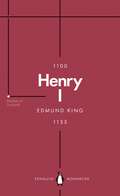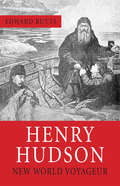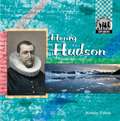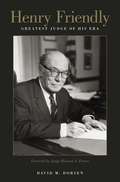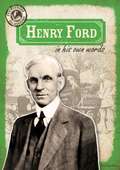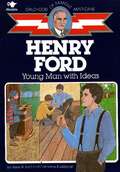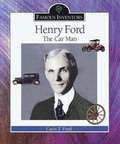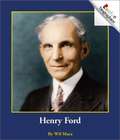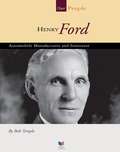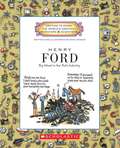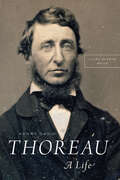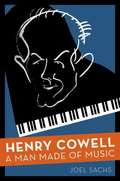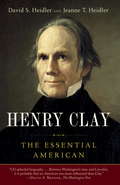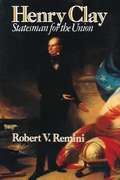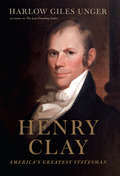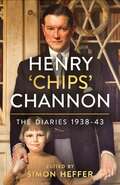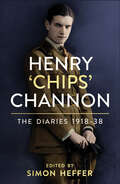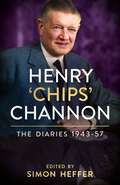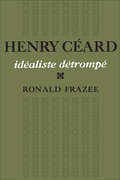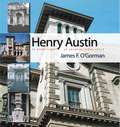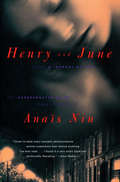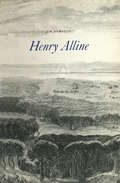- Table View
- List View
Henry I: The Father of His People (Penguin Monarchs)
by Edmund King'To be a medieval king was a job of work ... This was a man who knew how to run a complex organization. He was England's CEO'The youngest of William the Conqueror's sons, Henry I came to unchallenged power only after two of his brothers died in strange hunting accidents and he had imprisoned the other. He was destined to become one of the greatest of all medieval monarchs, both through his own ruthlessness, and through his dynastic legacy. Edmund King's engrossing portrait shows a strikingly charismatic, intelligent and fortunate man, whose rule was looked back on as the real post-conquest founding of England as a new realm: wealthy, stable, bureaucratised and self-confident.
Henry Hudson: New World Voyager
by Edward ButtsIn 1607 Henry Hudson was an obscure English sea captain. By 1610 he was an internationally renowned explorer. He made two voyages in search of a Northeast Passage to the Orient and had discovered the Spitzbergen Islands and their valuable whaling grounds. In the process, Hudson had sailed farther north than any other European before him. In 1609, working for the Dutch, he had explored the Hudson River and had made a Dutch colony in America possible. Sailing from England in 1610, on what would be his most famous voyage, Hudson began his search for the Northwest Passage through the Canadian Arctic. This was also his last exploration. Only a few of the men under his command lived to see England again. Hudson’s expedition was one of great discovery and even greater disaster. Extreme Arctic conditions and Hudson’s own questionable leadership resulted in the most infamous mutiny in Canadian history, and a mystery that remains unsolved.
Henry Hudson
by Kristin PetrieThis biography introduces young readers to the life of Englishman Henry Hudson. Readers learn that Hudson's grandfather helped form the Muscovy Company and that Hudson himself later sailed for the Muscovy Company, trying to find a passage to Asia through the North Pole. Hudson's family life and work as a cabin boy are also discussed, as well as his voyage with John Davis to the Canadian Arctic. Through engaging text, readers learn that Hudson's goal was to find a shorter route from Europe to Asia through the Arctic Ocean. His attempts to find a northwest passage to Asia while working for the Dutch East India Company and the British East India Company are explained. Readers also discover that on his final voyage, Hudson was the victim of a mutiny and left to die in the Hudson Bay. The book explains that Hudson's discoveries led to Dutch and English colonization of North America and that today a strait, a bay, and a river are named after Hudson. The book also introduces the idea that Hudson's North American discoveries led other explorers to discover a Northwest Passage.
Henry Friendly, Greatest Judge of His Era
by David M. DorsenFriendly served on the Second Circuit from 1959 to 1986. In the foreword, Judge Richard A. Posner refers to his own skeptical statements about the utility of biographies of judges; pointedly, he reverses that opinion completely with regard to this biography. Washington, D. C. -based attorney Dorsen draws on extensive research and interviews to provide a thoroughly engaging portrait of a brilliant and esteemed man. Belknap Press is an imprint of Harvard U. Press. Annotation ©2012 Book News, Inc. , Portland, OR (booknews. com)
Henry Ford in His Own Words
by Ryan NagelhoutHenry Ford, founder of the Ford Motor Company, didn't invent the car or even his famous assembly line. However, he was the innovator who made these things wildly successful. In fact, his practices and ideas shaped American life and business in the twentieth century, even helping the war effort in World War II, and continue to do so today. This biography uses quotations and writings to trace Henry Ford's rise from humble farm boy to thriving entrepreneur.
Henry Ford for Kids: His Life and Ideas, with 21 Activities (For Kids series #61)
by Ronald A. ReisAn in-depth and realistic portrait of the man who "put America on wheels" Detailing Henry Ford's childhood as a precocious farm-boy mechanic, his revolutionary labor and production ideas, and the lasting legacy of his widespread philanthropy, author Ronald A. Reis also does not shy away from his eccentricities. The issues that stirred controversy are discussed, such as the industrialist's anti-Semitic views and his pacifist beliefs. Packed with historic photos and illuminating sidebars, Henry Ford for Kids brings the turn of the 20th century to life, touching on related topics such as the popularity of "auto polo," the Great War, and the life of industrial architect Albert Kahn. Twenty-one hands-on activities encourage budding innovators to apply engineering and production ideas and learn more about the era as kids will build a lemon-powered battery, make a moving assembly line, learn to dance the waltz, design an automobile dashboard, and much more.
Henry Ford: Young Man with Ideas (Childhood of Famous Americans Series)
by Hazel B. Aird Catherine RuddimanA fictionalized biography of the early life of the American automotive industrialist who founded the Ford Motor Company and pioneered in assembly-line methods of mass production.
Henry Ford: The Car Man
by Carin T. FordA simple biography of the man who revolutionized American industry with his assembly-line production of automobiles.
Henry Ford
by Wil Mara- Age-appropriate vocabulary- Clear linkage between text and photos- Includes archival reproductions where appropriate- Positioned in the middle Early Intervention range- Comprehensive glossary of "Words You Know"- Index makes navigating subject matter easy
Henry Ford: Automobile Manufacturer and Innovator
by Bob TempleA biography of the man responsible for mass producing the automobile in the early part of the twentieth century.
Henry Ford: Big Wheel in the Auto Industry
by Mike VeneziaThis colorful business giant didn't just revolutionize the way the world travels he changed the way it works! Take a ride in the fast lane with Henry Ford, father of the automobile, the assembly line, and 20th-century American industry.
Henry David Thoreau for Kids: His Life and Ideas, with 21 Activities
by Corinne SmithHands-on nature activities for the budding transcendentalist Author and naturalist Henry David Thoreau is best known for living two years along the shores of Walden Pond in Concord, Massachusetts. He is also known for spending a night in jail for nonpayment of taxes, which he discussed in the influential essay "Civil Disobedience." More than 150 years later, people are still inspired by his thoughtful words about individual rights, social justice, and nature. His detailed plant observations have even proven to be a useful record for 21st-century botanists. Henry David Thoreau for Kids chronicles the short but influential life of this remarkable thinker. In addition to learning about Thoreau's contributions to our culture, young readers will participate in engaging, hands-on projects that bring his ideas to life. Activities include building a model of the Walden cabin, keeping a daily journal, planting a garden, baking trail-bread cakes, going on a half-day hike, and starting a rock collection. The book also includes a time line and list of resources--books, websites, and places to visit--which offer even more opportunities to connect with this fascinating man.
Henry David Thoreau: A Life (Science And Literature Ser.)
by Laura Dassow Walls“Walden. Yesterday I came here to live.” That entry from the journal of Henry David Thoreau, and the intellectual journey it began, would by themselves be enough to place Thoreau in the American pantheon. His attempt to “live deliberately” in a small woods at the edge of his hometown of Concord has been a touchstone for individualists and seekers since the publication of Walden in 1854. But there was much more to Thoreau than his brief experiment in living at Walden Pond. A member of the vibrant intellectual circle centered on his neighbor Ralph Waldo Emerson, he was also an ardent naturalist, a manual laborer and inventor, a radical political activist, and more. Many books have taken up various aspects of Thoreau’s character and achievements, but, as Laura Dassow Walls writes, “Thoreau has never been captured between covers; he was too quixotic, mischievous, many-sided.” Two hundred years after his birth, and two generations after the last full-scale biography, Walls restores Henry David Thoreau to us in all his profound, inspiring complexity. Walls traces the full arc of Thoreau’s life, from his early days in the intellectual hothouse of Concord, when the American experiment still felt fresh and precarious, and “America was a family affair, earned by one generation and about to pass to the next.” By the time he died in 1862, at only forty-four years of age, Thoreau had witnessed the transformation of his world from a community of farmers and artisans into a bustling, interconnected commercial nation. What did that portend for the contemplative individual and abundant, wild nature that Thoreau celebrated? Drawing on Thoreau’s copious writings, published and unpublished, Walls presents a Thoreau vigorously alive in all his quirks and contradictions: the young man shattered by the sudden death of his brother; the ambitious Harvard College student; the ecstatic visionary who closed Walden with an account of the regenerative power of the Cosmos. We meet the man whose belief in human freedom and the value of labor made him an uncompromising abolitionist; the solitary walker who found society in nature, but also found his own nature in the society of which he was a deeply interwoven part. And, running through it all, Thoreau the passionate naturalist, who, long before the age of environmentalism, saw tragedy for future generations in the human heedlessness around him. “The Thoreau I sought was not in any book, so I wrote this one,” says Walls. The result is a Thoreau unlike any seen since he walked the streets of Concord, a Thoreau for our time and all time.
Henry Cowell: A Man Made of Music
by Joel SachsJoel Sachs offers the first complete biography of one of the most influential figures in twentieth-century American music. Henry Cowell, a major musical innovator of the first half of the 20th century, left a rich body of compositions spanning a wide range of styles. But as Sachs shows, Cowell's legacy extends far beyond his music. He worked tirelessly to create organizations such as the highly influential New Music Quarterly, New Music Recordings, and the Pan-American Association of Composers, through which great talents like Ruth Crawford Seeger and Charles Ives first became known in the US and abroad. As one of the first Western advocates for World Music, he used lectures, articles, and recordings to bring other musical cultures to myriad listeners and students including John Cage and Lou Harrison, who attributed their life work to Cowell's influence. Finally, Sachs describes the tragedy of Cowell's life, being sentenced to fifteen years in San Quentin -- of which he served four -- after pleading guilty to a morals charge that even the prosecutor felt was trivial. Providing a wealth of insight into Cowell's ideas and philosophy, Joel Sachs lays out a much-needed perspective on one of the giants of twentieth-century American music.
Henry Clay: The Essential American
by David S. Heidler Jeanne T. HeidlerHe was the Great Compromiser, a canny and colorful legislator whose life mirrors the story of America from its founding until the eve of the Civil War. Speaker of the House, senator, secretary of state, five-time presidential candidate, and idol to the young Abraham Lincoln, Henry Clay is captured in full at last in this rich and sweeping biography.David S. Heidler and Jeanne T. Heidler present Clay in his early years as a precocious, witty, and optimistic Virginia farm boy who at the age of twenty transformed himself into an attorney. The authors reveal Clay's tumultuous career in Washington, including his participation in the deadlocked election of 1824 that haunted him for the rest of his career, and shine new light on Clay's marriage to plain, wealthy Lucretia Hart, a union that lasted fifty-three years and produced eleven children.Featuring an inimitable supporting cast including Thomas Jefferson, James Madison, and Abraham Lincoln, Henry Clay is beautifully written and replete with fresh anecdotes and insights. Horse trader and risk taker, arm twister and joke teller, Henry Clay was the consummate politician who gave ground, made deals, and changed the lives of millions.d replete with fresh anecdotes and insights. But it is Henry Clay who often rises above them all. Horse trader and risk taker, arm twister and joke teller, Clay was the consummate politician who gave ground, made deals, and changed the lives of millions. His life is an astounding tale--and here superbly told.From the Hardcover edition.
Henry Clay: Statesman for the Union
by Robert V. ReminiAmong nineteenth-century Americans, few commanded the reverence and respect accorded to Henry Clay of Kentucky. As orator and as Speaker of the House for longer than any man in the century, he wielded great power, a compelling presence in Congress who helped preserve the Union in the antebellum period. Remini portrays both the statesman and the private man, a man whose family life was painfully torn and who burned with ambition for the office he could not reach, the presidency.
Henry Clay: Statesman for the Union (citated)
by Robert V. ReminiRobert V. Remini summed up the sentiment that many people of the antebellum period of U.S. history had about Henry Clay. "Henry Clay was one of the most gifted men of his age. He distinguished himself as a public speaker, a lawyer, a politician, and Speaker of the House of Representatives. He might have made a truly great President" ([PAGE 209 OF THE TEXT]) if he had been given a chance. While praising Henry Clay, Remini also cited evidence that portrayed Clay as a controlling, hot-tempered, and often irrational, and immoral man. At times, people had trouble interacting with him while at other times he was extremely hospitable and friendly. In short, Remini described a man who both clamored for political power and, at the same time, wanted to contribute to the success of the country; that is, he deeply yearned for and acted in a manner that he thought was best for the union while simultaneously believing that he was the most qualified for this difficult task. In this biography, Remini described both the political and personal life of Henry Clay. Through this portrayal, the reader not only gains insight into the personal and political life of Henry Clay, but learns about the historical and cultural aspects of the time. The reader is able to enter into the struggles and conflicts of the age. These conflicts included such aspects as slavery and party politics. Even though this biography is non-fiction, it often reads as a fictional novel. Remini interspersed anecdotes, letters, and other writings into the historical details of the biography to allow the reader to understand the character and personality of Henry Clay and other famous and ordinary people. The biography is replete with numerous footnotes that give the biography authenticity as well as give the reader knowledge about the period and explanations about aspects that might not be understood by non-historians.
Henry Clay: America's Greatest Statesman
by Harlow Giles UngerA compelling new biography of America's most powerful Speaker of the House, who held the divided nation together for three decades and who was Lincoln's guiding light
Henry ‘Chips’ Channon (Volume 2): 1938-43
by Chips ChannonThe second volume of the remarkable, Sunday Times bestselling diaries of Chips Channon.'A masterpiece - a time machine that transports the reader back to British politics and high society at the end of the 1930s.' Robert Harris'The uncensored, unvarnished thought of one of the 20th century's greatest diarists. - Best Biographies of the Year, Telegraph'An unrivalled guide to the social and political life of Britain in the first half of the 20th century.' Books of the Year, The Times'Fascinating.' New Statesman'Never a dull day, never a dull sentence.' Daily Mail_______________________________________________This second volume of the bestselling diaries of Henry 'Chips' Channon takes us from the heady aftermath of the Munich agreement, when the Prime Minister so admired by Chips was credited with having averted a general European conflagration, through the rapid unravelling of appeasement, and on to the tribulations of the early years of the Second World War. It closes with a moment of hope, as Channon, in recording the fall of Mussolini in July 1943, reflects: 'The war must be more than half over.'For much of this period, Channon is genuinely an eye-witness to unfolding events. He reassures Neville Chamberlain as he fights for his political life in May 1940. He chats to Winston Churchill while the two men inspect the bombed-out chamber of the House of Commons a few months later. From his desk at the Foreign Office he charts the progress of the war. But with the departure of his boss 'Rab' Butler to the Ministry of Education, and Channon's subsequent exclusion from the corridors of power, his life changes - and with it the preoccupations and tone of the diaries. The conduct of the war remains a constant theme, but more personal preoccupations come increasingly to the fore. As he throws himself back into the pleasures of society, he records his encounters with the likes of Noël Coward, Prince Philip, General de Gaulle and Oscar Wilde's erstwhile lover Lord Alfred Douglas. He describes dinners with members of European royal dynasties, and recounts gossip and scandal about the great, the good and the less good. And he charts the implosion of his marriage and his burgeoning, passionate friendship with a young officer on Wavell's staff.These are diaries that bring a whole epoch vividly to life.
Henry ‘Chips’ Channon (Volume 1): 1918-38
by Chips ChannonThe Sunday Times bestselling edition of Chips Channon's remarkable diaries.Born in Chicago in 1897, 'Chips' Channon settled in England after the Great War, married into the immensely wealthy Guinness family, and served as Conservative MP for Southend-on-Sea from 1935 until his death in 1958. His career was unremarkable. His diaries are quite the opposite. Elegant, gossipy and bitchy by turns, they are the unfettered observations of a man who went everywhere and who knew everybody. Whether describing the antics of London society in the interwar years, or the growing scandal surrounding his close friends Edward VIII and Wallis Simpson during the abdication crisis, or the mood in the House of Commons in the lead up to the Munich crisis, his sense of drama and his eye for the telling detail are unmatched. These are diaries that bring a whole epoch vividly to life. A heavily abridged and censored edition of the diaries was published in 1967. Only now, sixty years after Chips's death, can an extensive text be shared.________________________________'Chips perfectly embodied the qualities vital to the task: a capacious ear for gossip, a neat turn of phrase, a waspish desire to tell all, and easy access to the highest social circles across Europe.[...] Blending Woosterish antics with a Lady Bracknellesque capacity for acid comment. Replete with fascinating insights.' Jesse Norman, Financial Times
Henry ‘Chips’ Channon: The Diaries (Volume 3): 1943-57
by Chips ChannonThis third and final volume of the unexpurgated diaries of Sir Henry 'Chips' Channon begins as the Second World War is turning in the Allies' favour. It ends with Chips descending into poor health but still able to turn a pointed phrase about the political events that swirl around him and the great and the good with whom he mingles.Throughout these final fourteen years Chips assiduously describes events in and around Westminster, gossiping about individual MPs' ambitions and indiscretions, but also rising powerfully to the occasion to capture the mood of the House on VE Day or the ceremony of George VI's funeral. His energies, though, are increasingly absorbed by a private life that at times reaches Byzantine levels of complexity. We encounter the London of the theatre and the cinema, peopled by such figures as John Gielgud, Laurence Olivier, Vivien Leigh and Douglas Fairbanks Jr, as well as a seemingly endless grand parties at which Chips might well rub shoulders with Cecil Beaton, the Mountbattens, or any number of dethroned European monarchs. He has been described as 'The greatest British diarist of the 20th century'. This final volume fully justifies that accolade.
Henry Cérard: idéaliste détrompé
by Ronald FrazeeHere for the first time is an authoritative account of the life and literary activity of a long-neglected writer of the French naturalist school. Its appearance now is especially timely in view of the recent revival of interest in Zola, Maupassant and Huysmans, and the publication of the complete Goncourt Journals. Cérard's written works were virtually neglected by his contemporaries as well as by most historians of the naturalist movement. However, his novels, short stories, and plays had good critical receptions, and in providing this study of the author, as well as a comprehensive bibliography of all his works, Mr. Frazee is performing a valuable service for students of literature. As an artist Cérard was perhaps less powerful than Zola or Goncourt, but one appreciates, as Mr. Frazee has noted, "la prédominance de l'esprit d'analyse sur l'esprit d'imagination." An important contribution was his early experimental novel Une belle journée; this explored in depth a single day in a character's life, and was the first of a number of such novels, which culminated in Joyce's Ulysses. While attempting to give Cérard his due as an artist Mr. Frazee, in seeking to discover the relations between this paradoxical personality and his work, has not hesitated to point out Cérard's personal failings. Cérard was an intriguing blend of deceptive simplicity and surprising complexity, and he showed a pessimism and resignation, typical of the fin de siècle, which were evidence of the influence of Schopenhauer. Because secondary writers often give a better picture of their times than their better-known contemporaries, this biography, too, is able to shed new light on the last thirty years of the nineteenth century while providing an important guide for today's scholars and the future investigators of an important area of French literature.
Henry Austin: In Every Variety of Architectural Style (Garnet Books)
by James F. O'GormanHenry Austin's (1804-1891) works receive consideration in books on nineteenth-century architecture, yet no book has focused scholarly attention on his primary achievements in New Haven, Connecticut, in Portland, Maine, and elsewhere. Austin was most active during the antebellum era, designing exotic buildings that have captured the imaginations of many for decades. James F. O'Gorman deftly documents Austin's work during the 1840s and '50s, the time when Austin was most productive and creative, and for which a wealth of material exists. The book is organized according to various building types: domestic, ecclesiastic, public, and commercial. O'Gorman helps to clarify what buildings should be attributed to the architect and comments on the various styles that went into his eclectic designs. Henry Austin is lavishly illustrated with 132 illustrations, including 32 in full color. Three extensive appendices provide valuable information on Austin's books, drawings, and his office.
Henry and June: From "A Journal of Love," The Unexpurgated Diary (1931–1932) of Anaïs Nin
by Anaïs NinThis bestseller covers a single momentous year during Nin’s life in Paris, when she met Henry Miller and his wife, June. “Closer to what many sexually adventuresome women experience than almost anything I’ve ever read....I found it a very erotic book and profoundly liberating” (Alice Walker). The source of a major motion picture from Universal. Preface by Rupert Pole; Index.
Henry Alline: 1748-1784
by J. M. BumstedTo Canadians of this century the name of Henry Alline is almost unknown. This biography introduces him to the general reader. Through the story of his life it also recreates the early settlement of the Maritime provinces, and examines the origins of one of the most dominant and continuing themes in Canadian life, evangelical pietism. Henry Alline emigrated from Rhode Island to Nova Scotia with his parents in 1760. Following his religious conversion during adolescence, he became an evangelical preacher and travelled throughout Nova Scotia spreading the gospel. But Alline was more than an itinerant preacher. Drawing on British (and indirectly on German) mythical writings, he rejected the tenets of Calvinism in favour of universal salvation and human free will. He emphasized Christian asceticism and mysticism. His writings, and his attempts to develop an intellectual rationale for his evangelical position, made him Canada's first metaphysical and mystical philosopher.In the history of early British settlement in Nova Scotia the name of Alline stands out because of his participation in the process and problems of settlement and his leadership during the trying times of the American Revolution. His career embodied a rejection of both the United States (by a rejection of Puritanism) and of Britain (by a rejection of church and state in Nova Scotia), and put Alline in a classic Nova Scotia position, neutrality, which could be justified by the importance of Christ and the relative unimportance of government. The years in which Alline lived were particularly critical ones for Canada, and his career both mirrors and dominates a period of pioneer hardships, political crises, and spiritual concern born of the uncertainties of human existence.
